Want more housing stories from Lance Lambert’s ResiClub in your inbox? Subscribe to the free, daily ResiClub newsletter.
At the height of the pandemic housing boom in May 2022, FirstKey Homes, an institutional landlord owned by private equity firm Cerberus, bought a three-bedroom house at 25080 Estrada Circle in Punta Gorda, Florida for $445,000.
After putting it on the market for rent in July 2022, taking it off the market, and putting it back on the market at a lower asking rent, FirstKey Homes decided to put the rental home for sale at $400,000 in February 2024.
Fast-forward to July 2024, and the home is still currently for sale, having seen its price cut six times to $336,000. If it sells for that amount, it would represent a 25% decline from its May 2022 purchase.
While national aggregate home price indices are hovering around all-time highs, some regional housing markets in states like Florida, Texas, and Louisiana are experiencing home price corrections. This includes the Punta Gorda metro area in Southwest Florida.
Click here to view an interactive of the chart below.
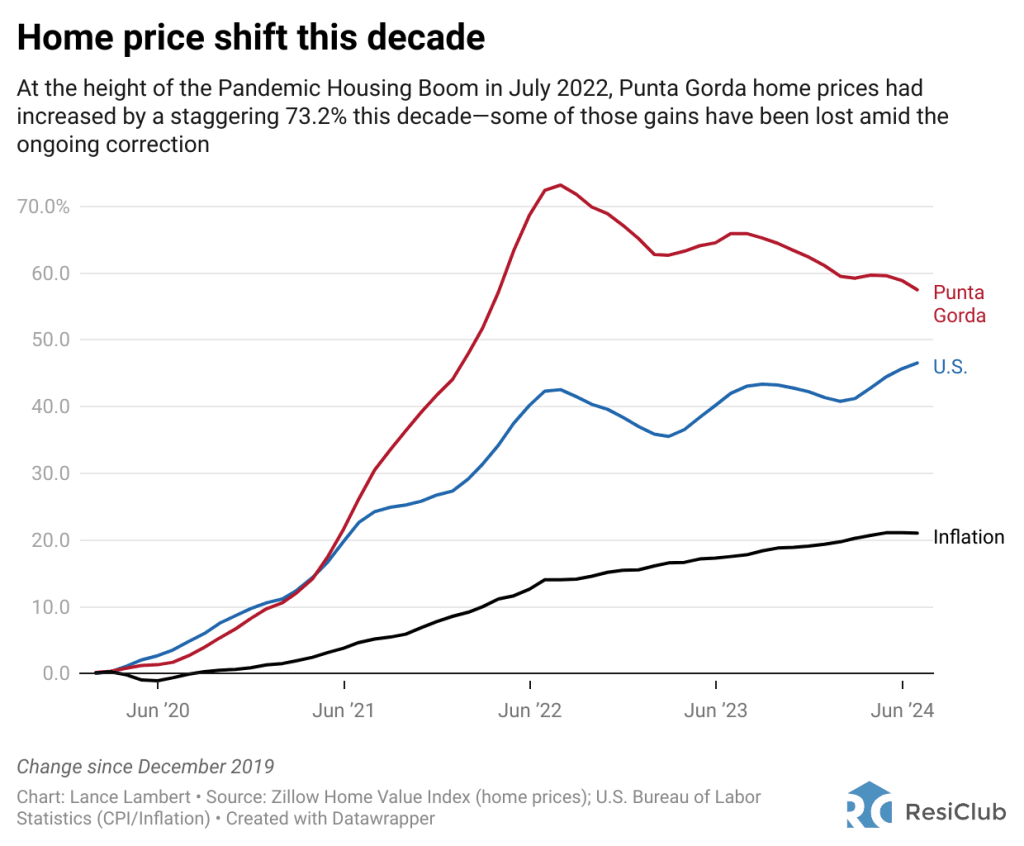
While the pandemic housing boom was fierce across the board, it was particularly intense in Punta Gorda, which was impacted by accelerated retirement and work-from-home migration.
Between December 2019 and July 2022, home prices in the U.S. soared 42.6%. During that same time period, home prices jumped a staggering 73.2% in Punta Gorda.
Not long after mortgage rates spiked, and migration shifted, Punta Gorda slipped into what ResiClub calls “correction mode.”

This isn’t the first time that Punta Gorda has passed through a home price correction.
Indeed, Punta Gorda was one of the hardest hit housing markets during the housing bubble burst in 2008.
From peak to trough, U.S. home prices fell 26.2% from the real estate bubble peak in 2006 to the bottom in 2012. In comparison, Punta Gorda home prices fell 47.8% from their peak in 2006 to their bottom in 2011.
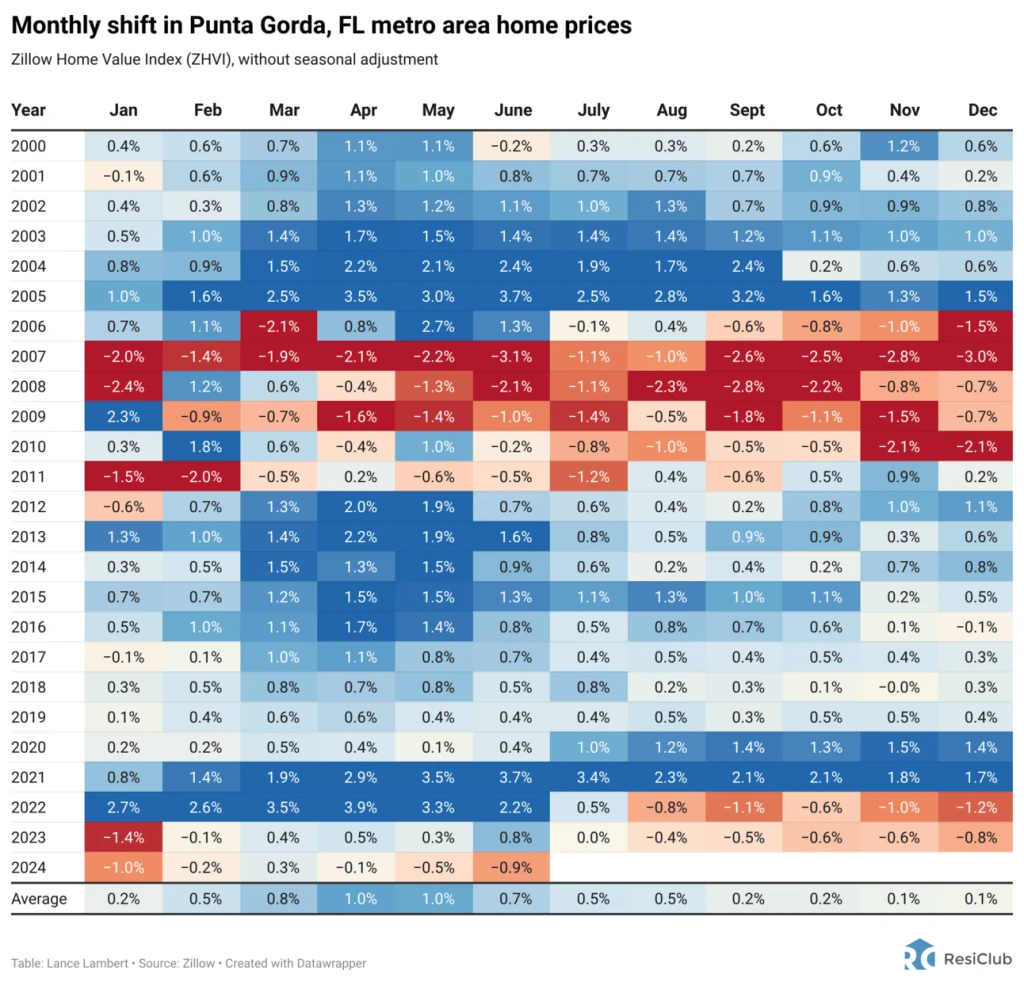
Home prices in Punta Gorda haven’t stopped falling yet, and likely have further to fall in the second half of 2024.
The telltale sign is that Punta Gorda saw very little positive home price appreciation during the spring season window. Historically speaking, housing markets that see very little appreciation during that first half period, usually see outright price declines once the market moves into the softer seasonal window in the second half of the year.
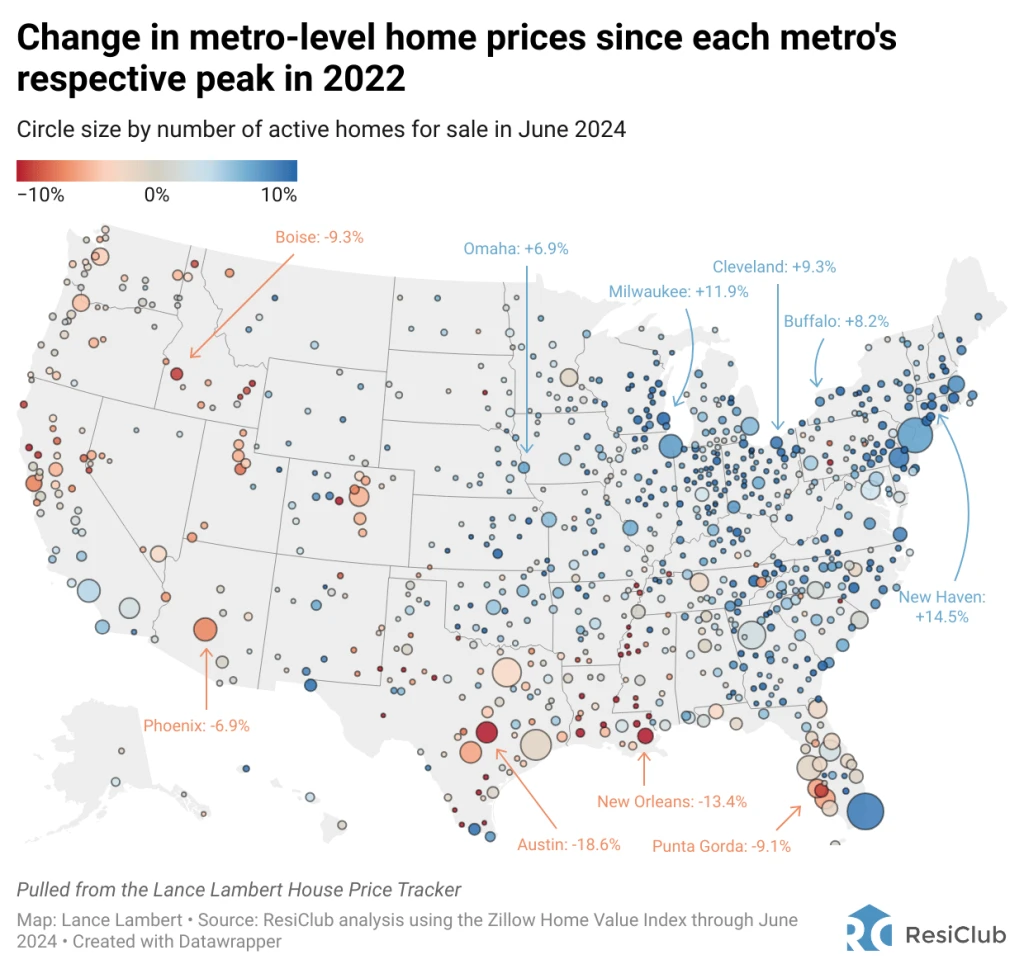
The vast majority of housing markets in the Midwest and Northeast and Southern California have higher home prices now than when mortgage rates first spiked in mid-2022.
Not Punta Gorda.
Home prices in Punta Gorda are down 9.1% from its 2022 price peak. Only a few markets, like Austin (-18.6%) and New Orleans (-13.4%), have seen bigger dips.
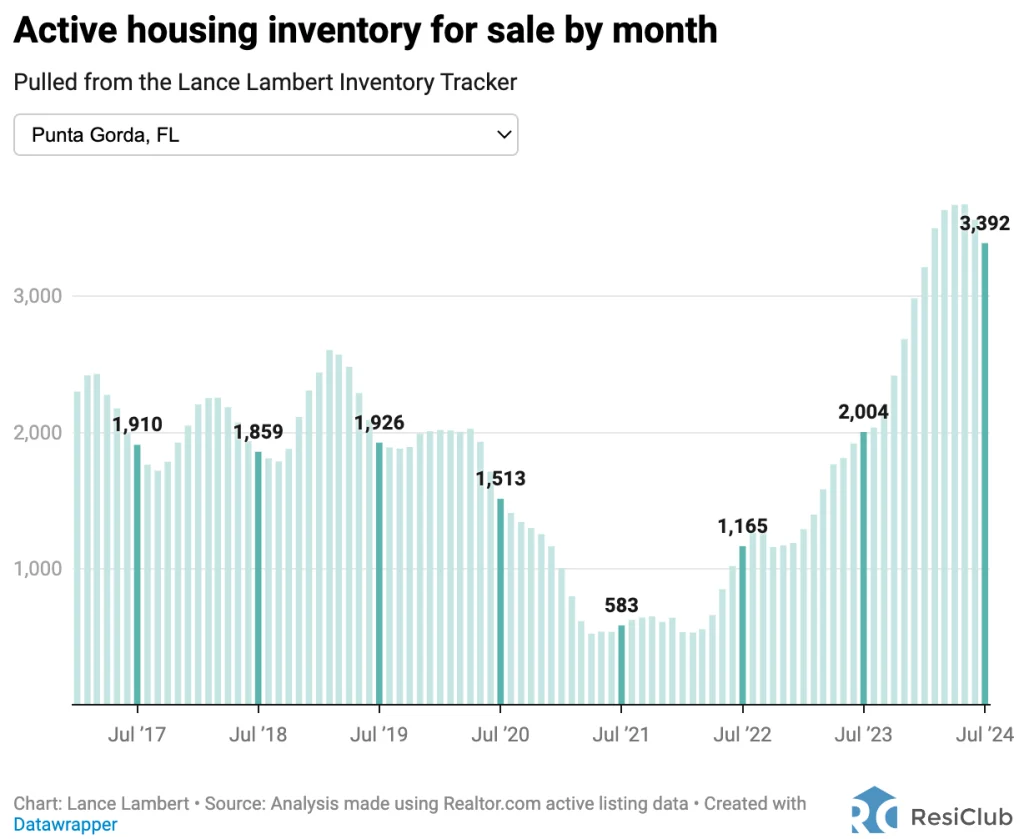
When assessing home price momentum, ResiClub believes it’s important to monitor active listings and months of supply. If active listings start to rapidly increase, or get very high, as homes remain on the market for longer periods, it may indicate potential future pricing weakness. Conversely, a rapid decline in active listings could suggest a market that is heating up.
In Punta Gorda, active inventory has seen sustained weakness since late 2022.
While U.S. active inventory in July 2024 is still 29% below pre-pandemic July 2019 levels, Punta Gorda housing inventory is 76% above pre-pandemic levels.
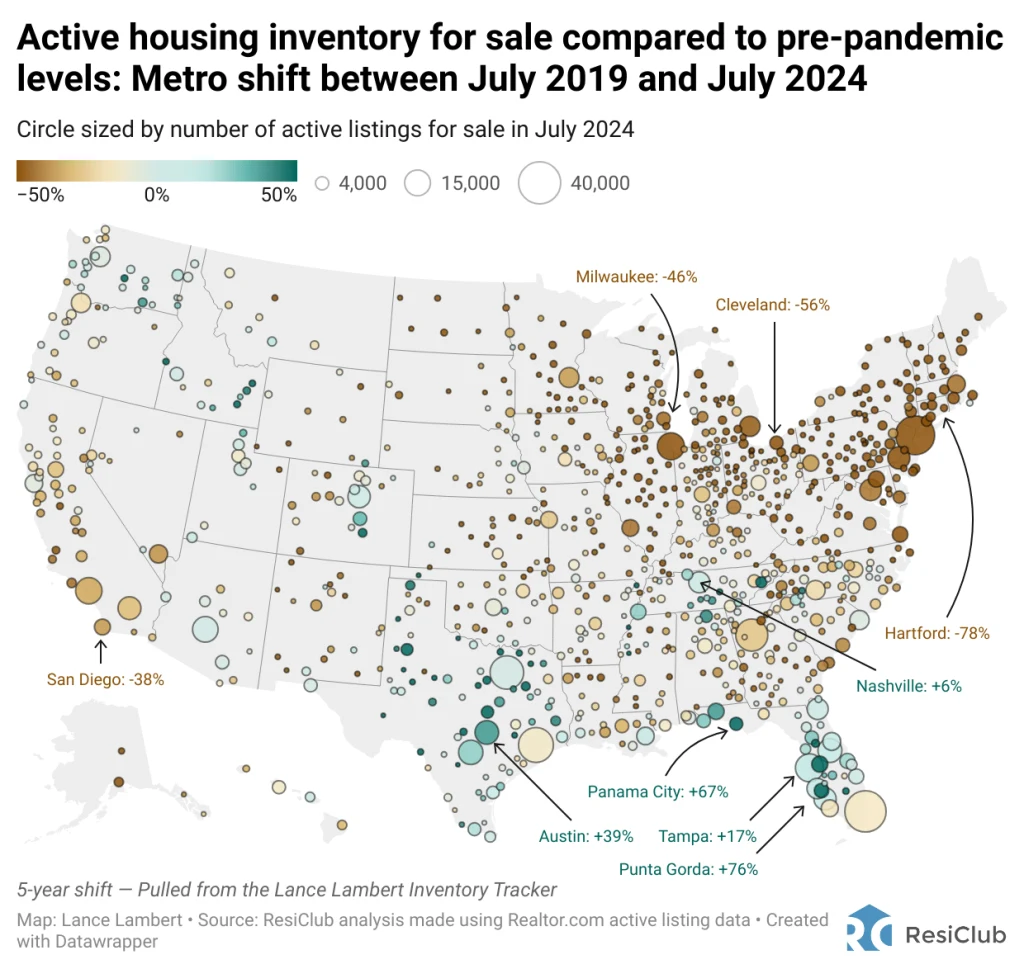
Another thing that accelerated the cooling in places like Punta Gorda, and also Cape Coral and Fort Myers, was Hurricane Ian in September 2022. The combination of increased housing supply for sale (the damaged homes) coupled with strained demand—the result of spiked home prices, spiked mortgage rates, higher insurance premiums, and higher HOA fees—translated into market softening across much of Southwest Florida.
In addition, Florida’s condo market is being affected by regulation passed following the Surfside condo collapse in 2021.

The biggest headwind for Punta Gorda’s housing market, however, is simply basic fundamentals.
The influx of demand during the pandemic housing boom stretched Punta Gorda home prices too far beyond local incomes. Once rates spiked and pandemic migration cooled, that stress became apparent.
According to Moody’s, Punta Gorda’s housing market in Q2 2022 was “overvalued” by 55.7%—far above the national overvaluation of 27% at the time.
Given the ongoing correction in Punta Gorda home prices, and some income gains, its overvaluation came in at 28.3% in Q4 2023, according to Moody’s. However, that’s still higher than the 13.9% national overvaluation Moody’s estimated for that quarter.

Despite having a much smaller population, Punta Gorda’s metro area (206,134 residents) permitted more home construction during the pandemic housing boom than many older Midwest and Northeast markets, including Pittsburgh (which has 2.4 million residents).
While single-family homebuilding isn’t the core cause of the Punta Gorda correction, the influx of new construction in this strained environment, combined with builders implementing aggressive affordability adjustments such as significant mortgage rate buydowns or outright price cuts, contributes to further weakening the resale market there.
Think of it like this: Why look at resale—as many existing home sellers still refuse to accept that prices have fallen double-digits—when large homebuilders, like D.R. Horton, are willing to throw out big deals in Punta Gorda? Thus resale inventory sits longer.
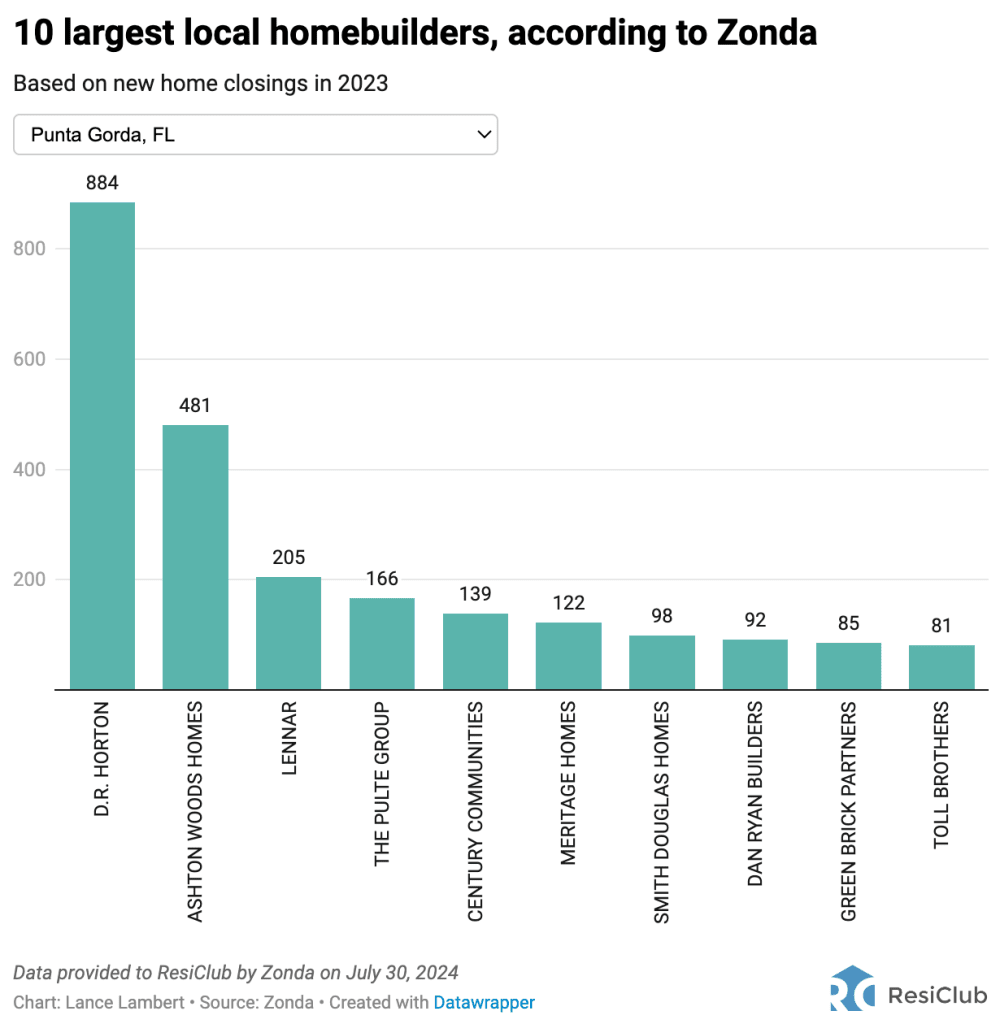
Big picture: We’re in the midst of a bifurcated housing market, where some of the hottest housing markets of the pandemic housing boom, like Punta Gorda, are passing through a correction, while other markets, particularly in the Northeast and Midwest, remain tight and competitive. And some markets are somewhere in between.